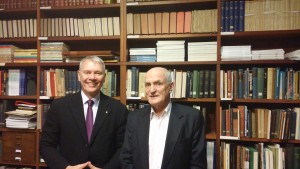The Revolution in Financing Global Health Delivery
Bill Bowtell, a former adviser to both Paul Keating and his Health Minister Neal Blewett, gave an arresting talk at Glover Cottages on 9 June on three international health scourges – malaria, tuberculosis and AIDS. Bill was the architect of Australia’s successful response to HIV/AIDS in the 1980s, and now runs Pacific Friends, a private sector aid agency supported by the Global Vaccine Alliance, the United Nations and the Gates Foundation. His main concern was to get effective vaccines into the bodies of people in poor countries. By 1996, AIDS was reduced, through a combination of therapies, from a pandemic to a manageable disease except in sub-Saharan Africa. Thabo Mbeki in particular had behaved disgracefully in ignoring its significance. Between them, Kofi Annan, Bill Gates and Nelson Mandela had reversed Mbeki’s do-nothing policy. Meanwhile, political conservatives in the West, especially in Washington, had tended to see aid agencies as anti-growth, anti-capitalist and corrupt. But the influence of the conservatives had been reduced by Clinton and the Bush family. In particular, between his election and 9/11, George W. Bush was particularly aware of the AIDS menace. Because of their improved sophistication, anti-viral drug treatment had been reduced to a single dose a day. By and large, through the application of money and technology, malaria and tuberculosis had followed a similar path. Millions had died of all three diseases, but the peak years had passed, and occurrences were on a downward path. Drug companies often got a bad reputation for only being interested in making money, but Bill was pragmatic. They operated on the capitalist system and were required to turn a profit for their shareholders, but they included some good people.
Of current concern were the emergence of drug-resistant strains of tuberculosis and malaria, and a general fall-off in immunisation, not only in third-world countries. Bill quoted extensive figures to show how all three diseases were being combated. Australia’s ODA had been cut and cut again by successive governments, but over recent years, Ministers, including Downer, Rudd, Gillard and Bishop, had kept reassuring Bill that their hearts were in the right place. The Global Fund should not be seen as the sole or even main source of funds to combat these diseases, but the challenge always was to make whatever money was available go further. By having existing aid agencies within countries administer new sources of funds instead of creating new ones was a money-saving start.
Summary by Richard Broinowski
